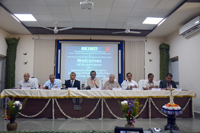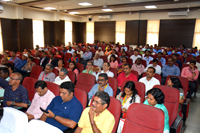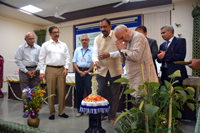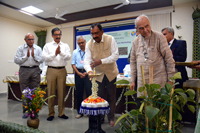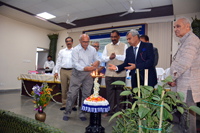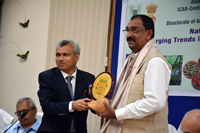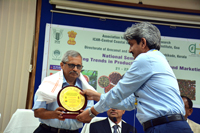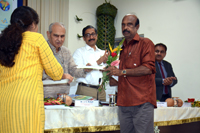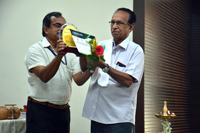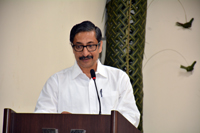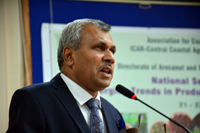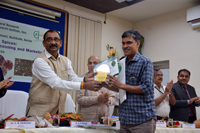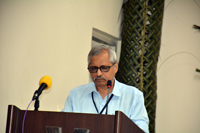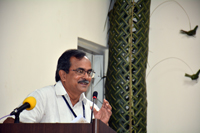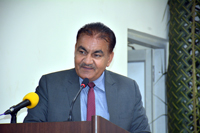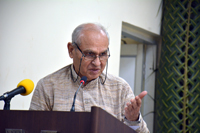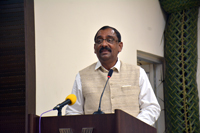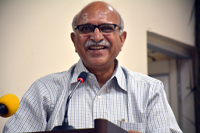
National Seminar on Spices : Emerging trends in production, processing and marketing
National Seminar on Spices : Emerging trends in production, processing and marketing
National Seminar on Spices : Emerging trends in production, processing and marketing was held at this Institute during 21-22 January 2020. The inaugural function was held at the KVK Hall on 21st January, 2020 . At the outset, Dr. E. B. Chakurkar, Director (A), ICAR-CCARI welcomed the dignitaries and the delegates and then the inauguration of the event was marked by lighting of traditional lamp by the Dignitaries on the dias. Dr. E. B. Chakurkar, Director (A), ICAR-CCARI welcomed and felicitated the Chief Guest, Dr. S. D. Sawant, Vice Chancellor, Dr. BSKKV, Dapoli and the Special Guest, Dr. J. C. Katyal, Ex DDG (Education), ICAR, New Delhi and Dr. Femina, Deputy Director, Directorate of Arecanut and Spices Development, Kozhikode welcomed and felicitated Dr. K. Nirmal Babu, Director, ICAR-IISR, Kozhikode. Dr. A. R. Desai, Principal Scientist and Organising Secretary of the Seminar welcomed and felicitated Dr. Gopal Lal, Director, ICAR-NRC for Seed Spices, Ajmer. Dr. Babulal Meena, Deputy Director, Directorate of Arecanut and Spices Development, Kozhikode welcomed and felicitated Shri. Madhav Kelkar, Director, Directorate of Agriculture, Government of Goa. Dr. M. Thangam, Principal Scientist and Secretary, Association for Coastal Agricultural Research welcomed and felicitated Dr. Homey Cheriyan, Director, DASD, Kozhikode and Dr. E. B. Chakurkar, Director (A), ICAR-CCARI .
During his introductory remarks, Dr. Homey Cherian, Director, DASD, Kozhikode emphasised the need to develop strategies for spice production in Konkan belt. Besides flavour, colour and aroma the applicability of spices as functional foods, pharmaceuticals and nutraceuticals needs to be promoted. He also stressed upon the need to address the issues of pesticide residue and microbial contamination for enhancing the quality and increasing the export.
Shri. Madhav Kelkar, Director, Directorate of Agriculture, Government of Goa expressed that organic cultivation of spice is an important step taken towards doubling the farmers’ income. He also mentioned that the rate of consumption of chemical fertilizers and pesticides are comparatively less in Goa and crops like arecanut, chilli are organic by default. He also emphasised that the farmers need to be made aware on the organic production technologies and the related protocols on organic certification.
Dr. K. Nirmal Babu, Director, ICAR-IISR, Kozhikode said that spices are low volume high value crops owing to their antimicrobial, nutraceutical and other special quality characters and that spices need to be valued for their intrinsic factors. He also highlighted that we need to exploit the strength of germplasm that we have of different spice crops and focus more on food safety aspects.
Dr. Gopal Lal, Director, ICAR-NRC for Seed Spices, Ajmer during his address stated that our country has a huge germplasm collection of more than 7000 accessions of seed spices and more than 200 varieties have been released for the benefit of farmers. For the past four years, there is fifty percent increase in area recorded in cumin. Spices are known to provide health and income security. He also stressed upon the need to adopt the Good Agricultural Practices in spices. He also emphasised the need to strengthen the value addition, processing and marketing industry. He also stated that strategies for reducing the pesticide residue need to be formulated.
Dr. J. C. Katyal, Ex DDG (Education), ICAR, New Delhi highlighted the significance of Glauconite as an alternate organic source of potassium, which is labelled as an organic fertilizer in US. Besides being environmentally safe this mineral reduces the cost of production. Though 19 million tonnes of Glauconite is available in states like Rajasthan, Gujarat, Madhya Pradesh, Uttar Pradesh and some parts of Karnataka, it is not yet listed in the Schedule of Minerals. Policy level decision for using this mineral for research purpose and commercial mining need to be taken. He also mentioned that more focus and promotion are needed on nutraceutical themes.
Dr. S. D. Sawant, Vice Chancellor, Dr. BSKKV, Dapoli said that a lot of extension work is needed for commercial cultivation of spices with improved technologies. Promising technologies like bush pepper production need to be promoted on a large scale for enhancing the income. He stated that it should be a zero residue crop and that spices are least affected by global warming. Availability of bulk quality planting material needs to be ensured by adopting improved propagation techniques like single bud rhizome technology in case of turmeric and ginger. He also highlighted the importance of profiling of phyto constituents to develop promising germplasm lines for future breeding programmes. He cited examples for patents being filed in Western countries for protocols for extraction of isomer of Vitamin E from grape seed, isolation of curcumin and synthesising anti cancerous phyto-chemical as available in Narkya (Mapia foetida) plants. By stating this he also stressed upon the need to strengthen our own research labs and expedite our research programmes.
Dr. A. R. Desai, Principal Scientist and Organising Secretary of the Seminar proposed the formal vote of thanks to one and all and the programme ended with National Anthem.
